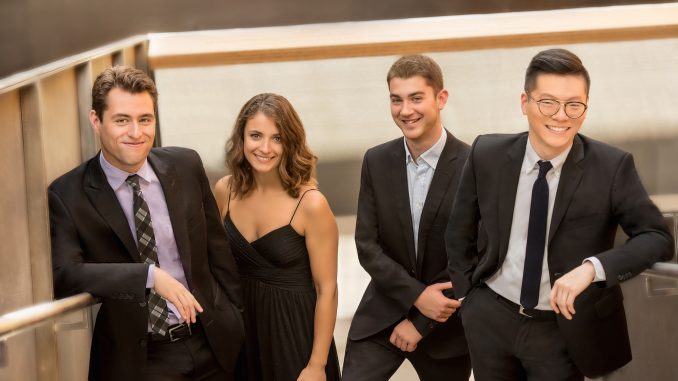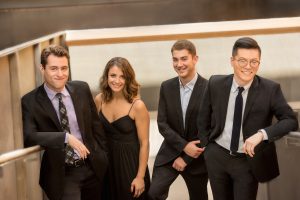
The Friends of Chamber Music are presenting the award-winning Dover String Quartet on Friday, April 6 at 7:30 PM at the 1900 Building. In the morning of Friday, April 6, the Dover Quartet will also give a performance-demonstration for the students of Carver Elementary School where students will hear a world-class string quartet performance and learn about what it means to perform as a professional musician. In their concert at the 1900 Building, the group will perform Haydn’s String Quartet in F Minor, Op. 20, No. 5; Schoenberg’s String Quartet in D Major; and Mendelssohn’s String Quartet in F Minor, Op. 80.
Listen to the featured repertoire by clicking here.
About the Dover String Quartet

The phenomenal Dover Quartet catapulted to international stardom following a stunning sweep of the 2013 Banff Competition. Recently named the Cleveland Quartet Award winner, and awarded the coveted Avery Fisher Career Grant, the Dover has become one of the most in-demand ensembles in the world. The Quartet’s rise from up-and-coming young ensemble to occupying a spot at the top of their field has been “practically meteoric” (Strings). With its burnished warmth, incisive rhythms, and natural phrasing, the Quartet’s distinctive sound has helped confirm its status as “the young American string quartet of the moment” (New Yorker). The Quartet serves as the quartet-in-residence for the Bienen School of Music at Northwestern University.
In 2017-18 the Dover Quartet performs more than a hundred concerts around North America and Europe. The Quartet opens the season with performances for Texas Performing Arts, Chamber Music Houston, and Performance Santa Fe before appearing for the Kennedy Center, Philadelphia Chamber Music Society, Library of Congress, Detroit Chamber Music Society, the La Jolla Music Society, and throughout North America and Europe. The Quartet will perform together with the superstar violinist Janine Jansen and pianist Jean-Yves Thibaudet in Carnegie Hall’s Stern Auditorium, and will also continue multi-year residencies for the Walton Arts Center’s Artosphere, Peoples’ Symphony, and the Amelia Island Chamber Music Festival.
Cedille Records releases the Quartet’s sophomore album, entitled Voices of Defiance: 1943, 1944, 1945 in October 2017. The recording takes listeners on a powerful journey through works written during World War II by Viktor Ullmann, Dimitri Shostakovich, and Simon Laks. The 2016-17 season saw the release of its all-Mozart debut recording on the Cedille label, a nod to the 1965 debut album of the Guarneri Quartet, whose founding violist, Michael Tree, joined the Dover Quartet on the recording.
In addition, the group undertook three complete Beethoven quartet cycles, including the University at Buffalo’s famous “Slee Cycle,” which has presented annual Beethoven quartet cycles since 1955 and has featured the likes of the Budapest, Guarneri, and Cleveland Quartets. Rounding out the Quartet’s season were a five-city U.S. tour with bassist-composer Edgar Meyer, a tour of the West Coast with mandolinist Avi Avital, and a European tour. The 2015-16 season included debuts at Carnegie Hall, Yale University, the Lucerne Festival, and as part of the
Lincoln Center “Great Performers” series. Festival appearances have taken the ensemble to the Bard Music Festival, Music at Menlo, La Jolla SummerFest, Artosphere, Chamber Music Northwest, and Caramoor, where the Quartet was named the 2013-14 Ernst Stiefel String Quartet-in-Residence. The group’s world-class collaborators have included pianists Anne-Marie McDermott, Marc-André Hamelin, Peter Serkin, and Jon Kimura Parker; violists Roberto Díaz and Cynthia Phelps; and the Pacifica and Escher Quartets.
In the spring of 2016, the Dover Quartet was recognized with the Hunt Family Award, one of the inaugural Lincoln Center Emerging Artist Awards, and in past years has taken top prizes at the Fischoff Competition and the Wigmore Hall International String Quartet Competition. All four Quartet members are consummate solo artists: first violinist Joel Link took first prize at the Menuhin Competition; violinist Bryan Lee and violist Milena Pajaro-van de Stadt have appeared as soloists with the Philadelphia Orchestra and Tokyo Philharmonic, respectively; and cellist Camden Shaw released a solo album debut on the Unipheye Music label. As Stradmagazine observes, “With their exceptional interpretative maturity, tonal refinement, and taut ensemble,” the Dover Quartet is “pulling away from their peers.”
Hailed as “the next Guarneri Quartet” (Chicago Tribune), the Dover Quartet draws from the lineage of that distinguished ensemble, as well that of the Cleveland and Vermeer Quartets; its members studied at the Curtis Institute of Music and Rice University’s Shepherd School of Music, where they were mentored extensively by Shmuel Ashkenasi, James Dunham, Norman Fischer, Kenneth Goldsmith, Joseph Silverstein, Arnold Steinhardt, Michael Tree, and Peter Wiley. It was at Curtis that the Quartet first formed, and its name pays tribute to Dover Beach by fellow Curtis alumnus Samuel Barber. The group has since returned for residencies to Rice in 2011-13, and to Curtis, where it became the conservatory’s first Quartet-in-Residence, in 2013-14. In addition, in 2015 the Dover was appointed the first Resident Ensemble of Peoples’ Symphony Concerts in the 116-year history of New York City’s oldest concert series.
The Dover Quartet is dedicated to sharing its music with under-served communities and is actively involved with Music for Food, an initiative enabling musicians to raise resources and awareness in the fight against hunger.
Haydn’s String Quartet in F Minor Op. 20, No. 5
Haydn’s Op. 20 Quartets (there are 6) are often described as the ’emancipation of the cello.’ Before this, the cello served as a harmonic anchor and didn’t play a lot of melodies. This quartet is full of cello melodies and will delight anyone who is a particular fan of the instrument. Haydn’s Opus 20 Quartets are also known as the “Sun” Quartets because the publisher (Hummel) printed a rising son on the sheet music’s frontispiece.
Schoenberg’s String Quartet in D Major
Schoenberg is most famous for his atonal[1] works and as the inventor of the 12-tone system[2], but he didn’t abandon traditional tonality until around 1908. This piece was composed during Schoenberg’s “Brahmsian[3]” Period, when he was struggling financially and doing a lot of hackwork for publishers. In fact, Brahms himself was so impressed by this specific piece that he offered to cover Schoenberg’s tuition at the Vienna Conservatory, but Schoenberg pridefully declined. Schoenberg did continue on to bigger and different things.
Mendelssohn’s Quartet in F Minor, Op. 80
Felix Mendelssohn was extremely close to his sister, Fanny, who died from a massive stroke in 1847. Felix began working on this quartet while traveling with family in Switzerland to recover from their grief. It seems as though Felix never recovered and died of a broken heart only two months later. This piece is one of the last things he composed and is informally known as a Requiem[4] for Fanny.
For more information about the performance or to purchase tickets, please visit our website: www.ChamberMusic.org or call us at 816-561-9999.
[1] Atonal music is music that lacks a tonal center, or key. You can also think of it as a departure from the traditional composition styles of composers like Bach, Haydn, or Mozart.
[2] The 12-tone system was invented by Arnold Schoenberg and refers to a compositional technique in which all twelve pitches of the chromatic scale are used once before repeating.
[3] Brahmsian here means “in the style of Johannes Brahms,” who was another famous composer of the time known for being Beethoven’s “successor.”
[4] A Requiem is an act or token of remembrance. It is also part of the Catholic mass as the repose of the souls of the dead.

Leave a Reply
You must be logged in to post a comment.